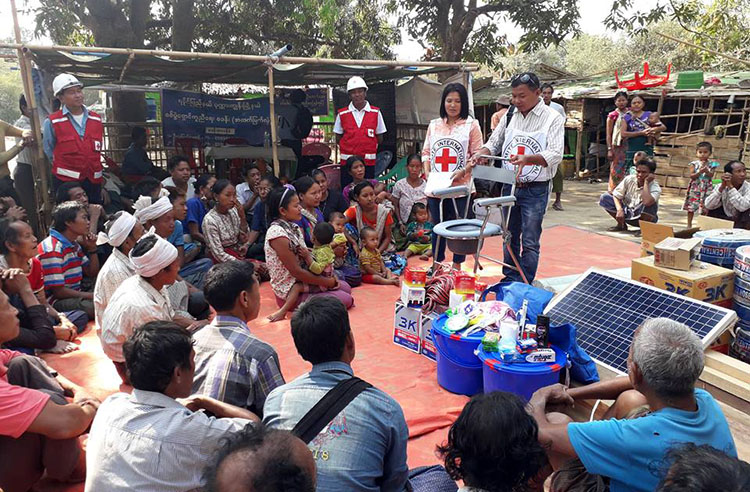- Arakan residents call for air raid warning systems amid surge in junta airstrikes
- Arakan’s Breathing Space (or) Mizoram–Arakan Trade and Business
- Death toll rises to 18 after junta airstrike on Ponnagyun village market
- Regime arrests dozens of Muslims in Sittwe over alleged Arakan Army links
- Over 200 IDPs in Ponnagyun struggle without shelter, food aid
Asking about ongoing assistance by ICRC to current displaced people in Rakhine state
DMG Interview with Ms. Dena Fisher, Head of Sub Delegation of Sittwe Office in Rakhine State on the situation of humanitarian aid provided by ICRC to the displaced people due to the clashes between Myanmar Army and Arakan Army.
26 Apr 2019

DMG Interview with Ms. Dena Fisher, Head of Sub Delegation of Sittwe Office in Rakhine State on the situation of humanitarian aid provided by ICRC to the displaced people due to the clashes between Myanmar Army and Arakan Army.
1: What kind of main assistances does ICRC distribute to the camps in Rakhine?
The ICRC has provided humanitarian assistance to displaced people, as well as host communities, providing items such as kitchen sets, hygiene and health kits, solar-lamps, jerry-cans, blankets, matting, clothes, shelter and latrine construction materials, water filters and buckets. The ICRC supports the Ministry of Health and Sports’ mobile clinics in IDP camps by offering emergency transportation and provides emergency health kits, dressing sets, medical supplies to 6 hospitals and other health facilities in Rakhine State.
2: How many camps are covered by ICRC?
Since December 2018, the ICRC, together with the MRCS, has visited over 30 locations in Rakhine and reached out to assist nearly 25,000 people from all communities, supporting them to meet their basic needs and access essential services.
3: It’s been discovered that ICRC distributed cash assistance to some camps, but it has been stopped, why? Please tell us?
Currently, the ICRC has provided humanitarian assistance to displaced people, especially food and essential household items. According to our assessment, while we were visited the IDP camps, many displaced people cannot go outside to buy everyday items for themselves, we are focusing on providing the aid in the form of needed items rather than cash assistance.
4: Does ICRC have any camps banned by authorities? If YES, why have authorities stopped the ICRC?
ICRC doesn’t have any restrictions by any group and can aid displaced people who are identified as such in relation to the current situation. The ICRC has open dialogues with groups of authority figures concerning assistance to IDPs who are staying around the fighting areas as well.
5: Monsoon season is coming soon, what is the assistance plan to the displaced people?
The ICRC is very concerned about the intensification of fighting and the increasing humanitarian consequences for all communities. Regarding the current displacement, if it becomes prolonged, the ICRC will continue to monitor the impact of conflicts on the civilian population, find ways to reduce the risks to which they are exposed and upgrade emergency shelters and water and sanitation facilities to face the upcoming monsoon season.
6: The Government allowed only ICRC and WFP to provide the assistance to current IDPs. Does ICRC have any talking points/advocacy messages to the authorities on giving permission to other humanitarian groups such as NGOs or INGOs to distribute the humanitarian assistance to current displaced people in Rakhine?
The ICRC, together with the Myanmar Red Cross Society (MRCS), have been among the first organizations to respond to the emergency needs of newly displaced communities in Rakhine. Since late December, and with the support of the Union and the State authorities, we have provided food, medical assistance and essential items to nearly 25.000 people located in over 30 different sites.
Meanwhile, given the growing scale, diversity and urgency of humanitarian needs and the Red Cross Movement’s limitations and constraints to comprehensively cover all of them, we have encouraged the authorities to facilitate access and lift restrictions for other humanitarian groups with a complementary capacity and expertise, to both respond to current emergency needs, support medium and long-term recovery efforts and ensure access to basic services across Rakhine.
Regarding the current displacement situation in particular, if it becomes prolonged, increased engagement of other humanitarian groups will be particularly needed to upgrade emergency shelter and water and sanitation facilities to face the upcoming rainy/cyclone season and support the relocation of those in flood-prone or exposed areas. Moreover, it will be important to ensure sound camp coordination and camp management as well as to facilitate access to additional basic services, such as education or psychosocial support. We have been recently informed that other humanitarian organizations are planning to join the emergency response, in cooperation with the state authorities. We welcome this and hope it will translate into a more comprehensive and sustainable humanitarian response for all displaced communities.







.jpg)












